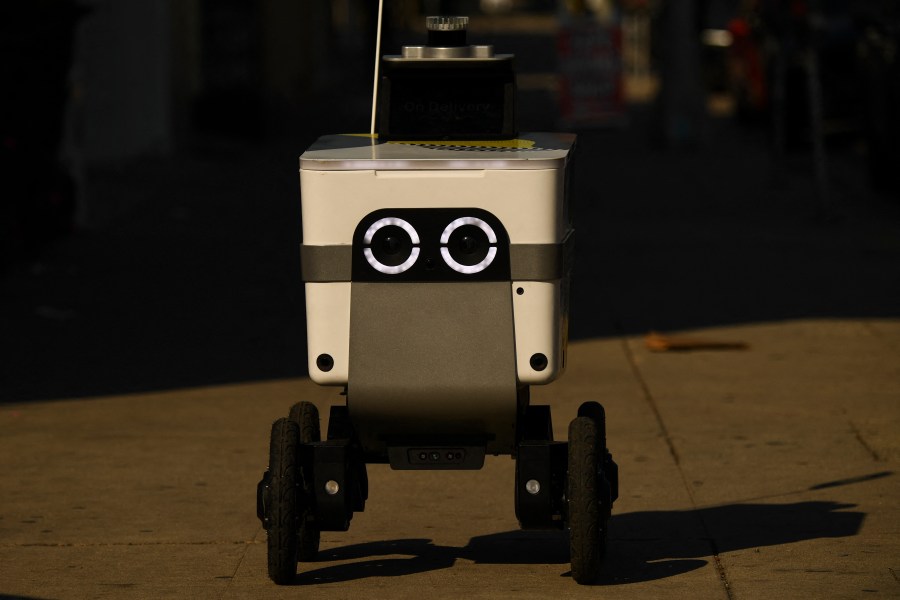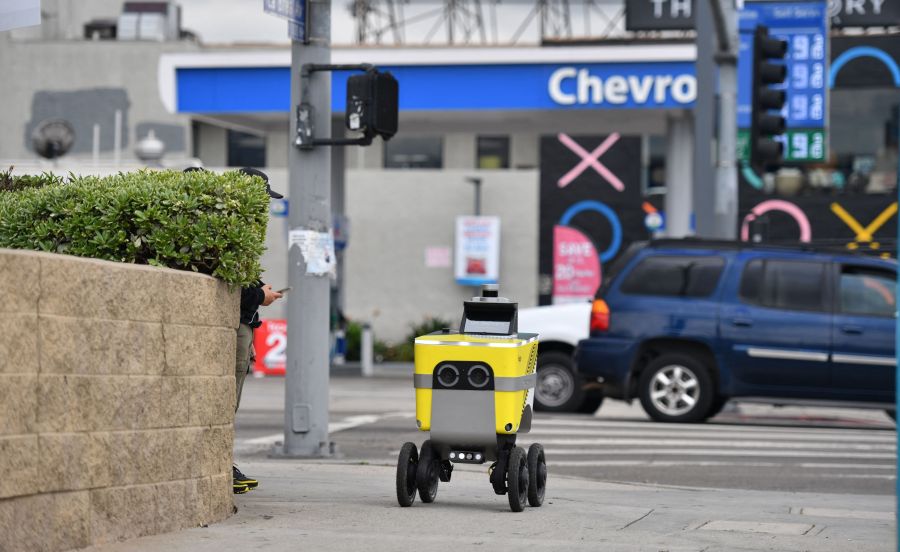The Los Angeles Police Department says it is not using video from food delivery bots as part of regular crime investigations, despite media reports that may imply otherwise.
A brief press release issued by the LAPD on Wednesday said media reports about the practice necessitated clarification from police officials.
The release was issued following the publication of a story by 404 Media, an independent news organization that covers, among other topics, technology and digital privacy.
Citing public records requests, the website alleged that food delivery bots seen on streets can and have been used as a crime-solving tool by law enforcement investigators.
The focus of the piece centers around a grand larceny investigation by the LAPD, in which two men allegedly tried to steal a food delivery robot owned by Serve Robotics.
Emails obtained by the publication appear to confirm that the robotics company uploaded video to the Police Department to assist in its investigation.

The CEO of Serve Robotics said in a blog post to Medium, that the company believed it was in the public’s interest to share the video with police as part of the investigation.
The blog post also outlines a set of principles that the company apparently employs to prevent misuse, although its unclear how strictly those principles are followed at the corporate level.
The article from 404 logically created concerns about police surveillance in an-ever changing world with cameras on every street corner, smart phone devices with the capability of being tracked by the government, and, perhaps no greater symbol of the changing technological world, than autonomous robots roaming city streets and filming civilians against their will.
Following the slippery slope argument, it makes sense that there could be genuine concern about these robots being misused for law enforcement purposes, essentially turning a food delivery robot into an automated sentry unit.
But in Wednesday’s news release, the LAPD pushed back at the idea, saying that it does not use and has not used videos from these delivery robots in any case, except in which the robotics companies were identified as victims.
“Recent reports have indicated that robotic delivery services are providing video footage to the Los Angeles Police Department. This is only true in cases where the robotic delivery company has been the victim of a crime,” the news release reads. “The Los Angeles Police Department is committed to constitutional policing and is sensitive to privacy concerns, while holding those who commit crime accountable.”
While uncomfortable for many, the robots do belong to the company that deploys them, and vandalism or theft is something the businesses would obviously like to prevent.
The robots travel primarily on public sidewalks, and the United States Supreme Court has affirmed that there is little expectation of privacy in public spaces.

It’s also not uncommon for law enforcement agencies to ask the public to willingly upload videos to assist in ongoing investigations.
Ring doorbell systems by Amazon can be enrolled in a neighborhood watch-style program called Neighbors, and law enforcement agencies involved in the program can request for users to upload videos. Legally speaking, you don’t have to upload anything, but police can still obtain video by other means, including by issuing a subpoena.
But in 2022, responding to an inquiry from Massachusetts Senator Ed Markey, Amazon, Ring’s parent company, admitted to handing over several videos to law enforcement without consent of video owners.
Amazon, at the time, said 11 recordings were handed over to law enforcement agencies without the consent of video owners, arguing that the decision was made in “good faith” when there was imminent danger of death or serious physical injury.
So while there’s likely nothing illegal about the recording themselves, 404 raises questions about the company’s willingness to work with law enforcement. It also raised concerns about how long these recordings are saved and, citing Serve’s privacy policy, found no answer to that question.
Repeated emails between the company and the LAPD hinted at the possibility of further “partnership” between the two entities.
What that partnership looks like, and whether or not these robotics companies have any plans to expand their cooperation with law enforcement beyond crimes in which the robot companies are victims, remains to be seen.
To read the complete report by 404 Media, click here.











